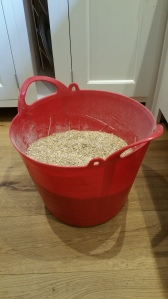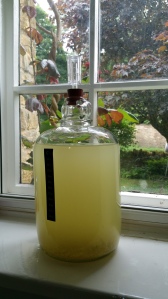I find that as soon as I get a burning interest in something, I need to read about it a lot…and while the Internet is fine for smallish articles, you can’t beat a book. I mean a real, tangible book; something that you can read in bed, on the bog or when you’re supposed to be listening to your wife.
When I got back into brewing, my old (circa. 1990) books on homebrewing sufficed; but after a while I needed better and more up-to-date sources of information.
That’s when the inevitable accumulation of yet more books began.
I was already a terrible book-hoarder: a career in IT, qualifications in hypnotherapy/psychology and various other random interests meant that I already had a veritable landslide of books.
In fact, books are everywhere – you can be pretty much stood or sat anywhere in our house and a book will be never more than an arms length away. So I didn’t need much of an excuse to start hoarding even more of them.
The following list isn’t an exhaustive list of references on the subject of brewing, they’re just a list of books that I’ve enjoyed and found useful as I went along.
Maybe you know of others that should be included here…please do let me know in the comments,
You can get most of these books from Greg at BrewUK…in fact I’ve even provided the links to them, so you can now pick up all your ingredients whilst also picking up a book or two. How nice is that?
On with the books…
Step One: Starting off
Graham Wheeler: Brew your own British Real Ale
This is the definitive starters’ book. Genuinely useful – tells you the basics of kit, extract and all-grain methods of brewing without being over-whelming. It has a ton of British real ale clone recipes, too; I made the Brakspear’s Bitter recipe when I started brewing all-grain and it was lovely.

http://www.brewuk.co.uk/brew-your-own-british-ale.html
Greg Hughes: Home Brew Beer
Another great book for starting off, in fact you’ll find it’s jam-packed with sage advice for all levels of homebrewer. Greg takes the time to guide you through the process without making it overly-complicated. A great book from the man behind BrewUK

http://www.brewuk.co.uk/home-brew-beer.html
John J. Palmer: How to Brew
A modern classic and the standard by which all other homebrewing books are judged, it does have a lot of information in it and quite a bit of science, so it’s not something I’d recommend for the absolute beginner. It expands nicely on the techniques first explored in the Wheeler book and you will find yourself coming back to it again and again…

http://www.brewuk.co.uk/how-to-brew.html
Randy Mosher: Mastering Homebrew
Densely packed: that’s how I’d describe this marvellous tome – it’s chock-full of information, all of it relevant and all of it useful. Brand new and smack up-to-date, it has pretty much the same information as the Palmer book, but somehow more accessible and with a slightly less scientific bent. Lovely graphics and beautifully written this verges on a “coffee-table” brewing book.
Step Three: Pushing the Boundaries/Brewing Inspiration
Randy Mosher: Radical Brews
I challenge you to not brew something interesting after reading this book. It’s glorious food for thought and really gets your creative juices going. I made a hop-bursted oatmeal stout after reading this and also dipped my toes into Saisons and Wheats. This is the book that I have pored over most in my brewing adventures.

http://www.brewuk.co.uk/radical-brewing.html
Ray Daniels: Designing Great Beers
Once you’ve got brewing weird and “out-there” stuff out of your system (for a while at least) you’ll start to want to learn to brew to style – especially if you’re thinking of entering competitions. In this book, Ray has ransacked the US National Homebrew Competition winners’ brains and discovered why certain beers won and what the recipes have in common. Helpful advice on getting your recipes and technique right when putting any style of beer you care to think of. This book is apt to be a little dry, and works best as a dip-in, dip-out reference work. You don’t have to follow the advice, but it’s there if you need it.

http://www.brewuk.co.uk/designing-great-beers.html
Step Five: Deeper into The Styles
Eric Carle: German Wheat Beer
This book was published sometime in the 90’s – but that doesn’t matter. German Wheat beer is still the same and the techniques and advice hold true. I’ve followed all of his advice in this book with some great results…I just ignored the bits about decoction mashing as, let’s face it, life is too short. Forgive me, Eric.

http://www.brewuk.co.uk/german-wheat-beers.html
Pierre Rajotte: Belgian Ale
This is another 1990’s book, but it’s the same deal as the German Wheat Beer book – Belgian ales don’t change that much and the advice is solid, plus it’s an entertaining read.

http://www.brewuk.co.uk/belgian-ale.html
Phil Marowski: Farmhouse Ales – Culture and Craftsmanship in the Belgian Tradition
An absolute must for those who want to brew Saison or Biere de Garde styles. It’s a lovely read and I’ve followed the advice contained therein and made some very nice Saison indeed.

http://www.brewuk.co.uk/farmhouse-ales.html
Jeff Sparrow: Wild Brews
Turn back, you’ve come too far. You’re now in the grip of a madness – murky conical flasks clutter up the house, mutterances of “Brett” and “Lacto ferments” are largely ignored by your wife or significant other. This is the more extreme end of brewing – but this is a great and engaging book, full of information and inspiration.

http://www.brewuk.co.uk/wild-brews.html
Michael Tonsmiere: American Sour Beer
Even if you don’t ever intend to make sour or wild beer you should own this book. Even if you’re a professional brewer, you should still own this book. So much information is contained within and all of it imparted in a straightforward and uncomplicated way – it even explains how the big boys (Russian River et al) are doing their sours and wilds. Well worth the money. I read this book a lot. Maybe too much.

http://www.brewuk.co.uk/american-sours.html
Step Six: Deeper into The Ingredients
Stan Hieronymous: For the Love of Hops
Way too much information about hops, varieties, co-humulones, alpha acid: all is explained. plus some recipes for monstrous hop-forward beers. Absorbing and interesting.

http://www.brewuk.co.uk/hops-for-the-love.html
John Palmer: Water – a Definitive Guide
This is a sizeable tome and I won’t pretend to understand even half of it. But there’s section on how to treat water for brewing, how to get rid of water as waste and so much more. But the chemistry is heavy going – evn though it’s masterful in it’s breadth

http://www.brewuk.co.uk/water-guide.html
John Mallet: Malt
Everything you could ever wish to know about malt. Right to the Nth degree. Again there’s quite a bit of chemistry here, but it’s a bit more accessible than that water book.
Chris White and Jamil Zainasheff: Yeast – The Practical Guide to Beer Fermentation
Out of all four of these books you must buy this one – it’s jam-packed with information and will help you make better beer. Most of us just bung in the yeast – after we’ve spent hours deliberating over hop and grain choices. Pay attention to your yeast and your fermentation temperatures and you’ll make great beer straight away.

http://www.brewuk.co.uk/yeast-your-guide.html
Step Seven: Other People’s Beer
Mark Dredge: Craft World
Achingly current and lovingly put together, this is a fine body of work that tells you exactly what is relevant in the world of craft beer now. Evocative in the tasting notes, I have been compelled to taste and occassionally emulate a lot of the beers listed in this book. Well worth the money
Michael Jackson: Michael Jackson’s Beer Companion
With not a single cha’mone in it (you know you’re into beer, when you think of this Michael Jackson, rather than that one) this is a lovely book that describes the styles, how they should taste and how they were made. I say “were” because of Mr Jackson’s untimely demise in 2007 before “craft beer” thing was in full swing and you couldn’t, for instance, really buy a Lambic beer that originated in England a la The Wild Beer Co. Dear old MJ would have loved this glorious beer renaissance.
Step Eight: Going Pro
Wolfgang Kunze: Technology Brewing and Malting
Know colloquially as “The Kunze” amongst professional brewers, this table collapsing volume runs to 960 pages and is considered the de-facto standard on the subject. I haven’t read it, but by all accounts it’s a mighty work, translated from the original German, that goes into exquisite detail on every single part of the process of brewing. At a fun-filled price of 149Euros (just over £100) it’s not exactly light on the pocket. Maybe I’ll ask for it for Christmas or something…



